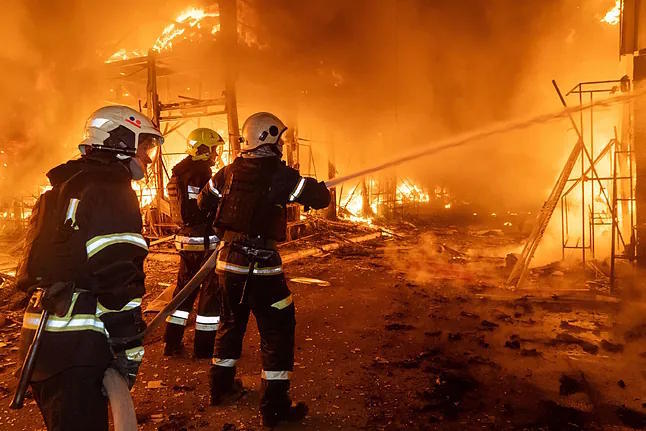New Russian nighttime bombings over Ukraine have left at least six people injured and several fires in the city of Kharkiv. The Kharkiv region, near the border with Russia, has been a regular target of Russian airstrikes since the beginning of the war.
Meanwhile, Zelensky warned on Tuesday that the situation at the Zaporizhzhia nuclear plant, occupied by Russia, has become critical as Russian bombings prevent the restoration of the necessary power supply to cool the reactors and prevent a possible nuclear meltdown.
The Zaporizhzhia plant, Europe's largest with six reactors, was seized by Russian troops in the early weeks of the February 2022 invasion. Since then, both sides have accused each other of endangering nuclear safety with attacks in the area. Although it currently does not generate electricity, the plant requires power to keep the fuel in the reactors cooled and prevent a catastrophe. This is the tenth time since the conflict began that the plant has been disconnected from the power grid.
Russia Claims Power Supply at Zaporizhzhia Nuclear Plant Is Sufficient Despite Ukrainian Bombings
The administration installed by Russia at the Zaporizhzhia nuclear plant declared on Wednesday that the backup power supply at the plant is sufficient, but resuming supply through the Dneprovskaya line is not possible due to Ukrainian bombings, as reported by the Russian state agency RIA.
Economy Establishes Office to Assist Companies Interested in Investing in Ukraine
The Ministry of Economy has established the Spanish Office for the Reconstruction of Ukraine, whose main objective will be to assist Spanish companies interested in investing in on-site projects in this country, as reported by Efe.
The new office - as explained in the royal decree regulating its creation, published on Wednesday in the BOE - will help mobilize official financial instruments, ensure coordination, and facilitate "regular visits to Ukraine" for companies.
The goal is to serve as a "one-stop shop" for private sector companies interested in seizing the "economic opportunity" of the country's reconstruction - estimated at $486 billion over the next ten years - while contributing to its recovery.
Around 42,000 Homes Without Power in Odesa Due to Recent Russian Attacks
Around 42,000 customers in 32 municipalities remained without electricity on Wednesday morning in the southern Ukrainian Odesa region due to recent Russian attacks that have affected the Ukrainian power system, as reported by the private electricity company DTEK, according to Efe.
During the previous day, DTEK specialists restored power to another 112,000 customers in 188 localities in the same region along the Black Sea coast who had also been left without power.
Since the start of the war, Russia has repeatedly targeted Ukrainian energy infrastructure, destroying numerous power plants and substations and also damaging other types of equipment.
Medvedev Mocks Trump Over Alleged Lack of Submarines Near Russia
Former Russian President Dmitry Medvedev mocked former U.S. President Donald Trump, stating that the United States has not sent nuclear submarines to Russian shores, as Trump had publicly claimed, as reported by Reuters.
On Tuesday, Trump called Medvedev a "stupid person" and stated that he had deployed "one or two submarines" near Russia. In August, he had said he ordered the movement of two nuclear submarines to "appropriate regions" in response to threats from the former Russian leader.
In response, Medvedev posted on his X account (formerly Twitter): "New episode of the suspense series. Trump talks again about the submarines he supposedly 'sent to Russian shores,' insisting they are 'very well hidden'."
Russian Drones, a Deadly Threat in Frontline Cities
Thousands of drones fly over more than 1,000 km of frontlines in eastern and southern Ukraine. The threat extends beyond the battlefield: it affects towns, cities, and any area within the 20-25 km belt on each side of the front, where fast drones, many with first-person view (FPV), operate.
Kramatorsk and Sloviansk were always within reach of Russian missiles, but now drones pose a constant, cheaper, more precise, and harder-to-intercept threat. Some are remotely guided or programmed to target specific objectives. Others, like fiber-optic drones, cannot be blocked by electronic interference. Their range can exceed 25 km, making them ideal for attacks within the frontline belt.
Russian Air Defense Units Destroy 20 Ukrainian Drones Overnight
Russian air defense units destroyed 20 Ukrainian drones overnight, as reported on Wednesday by the RIA news agency, citing the Russian Ministry of Defense.
